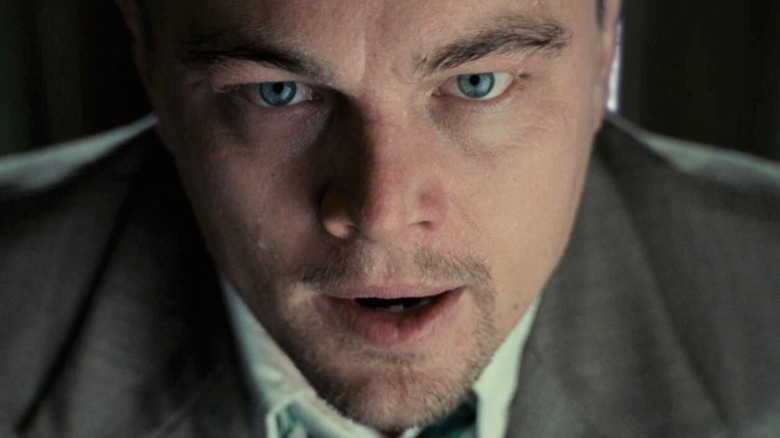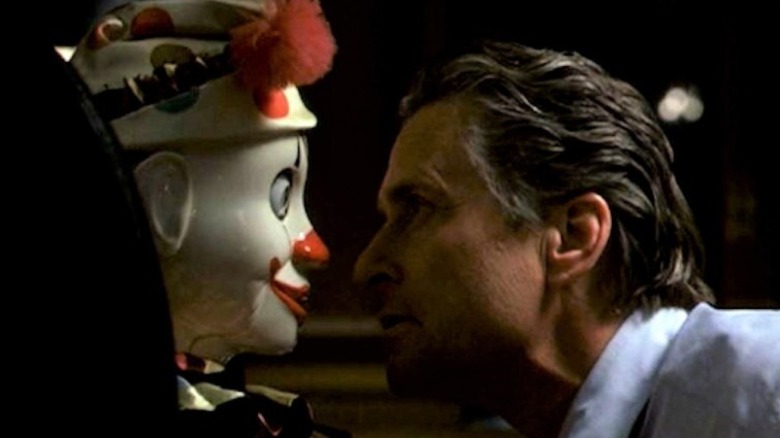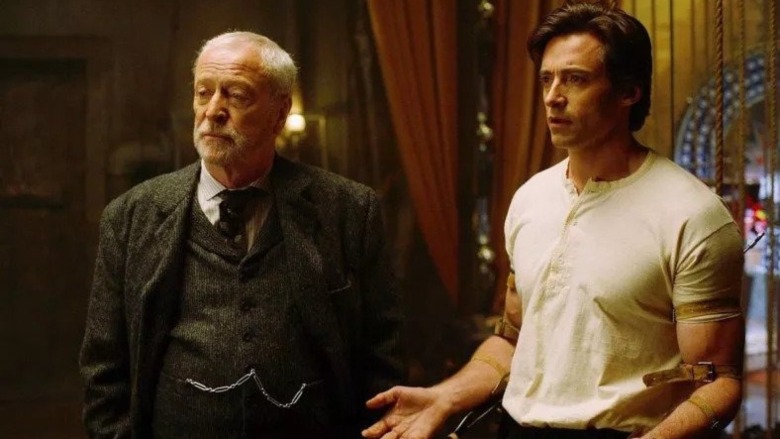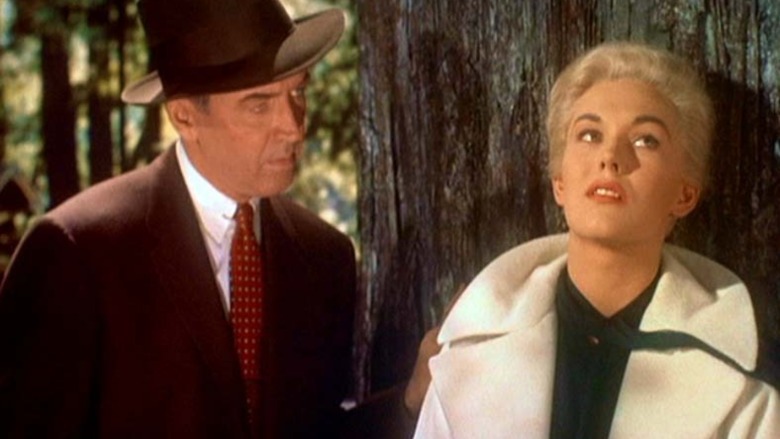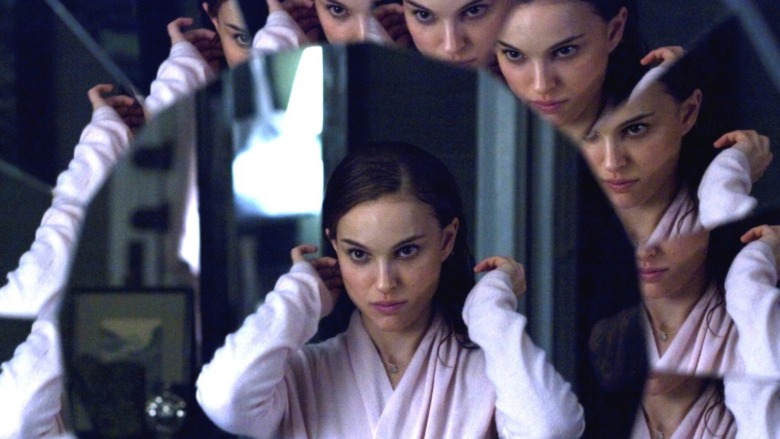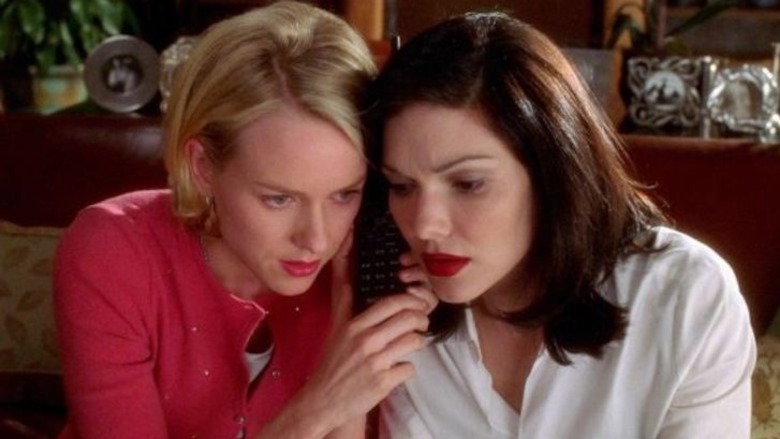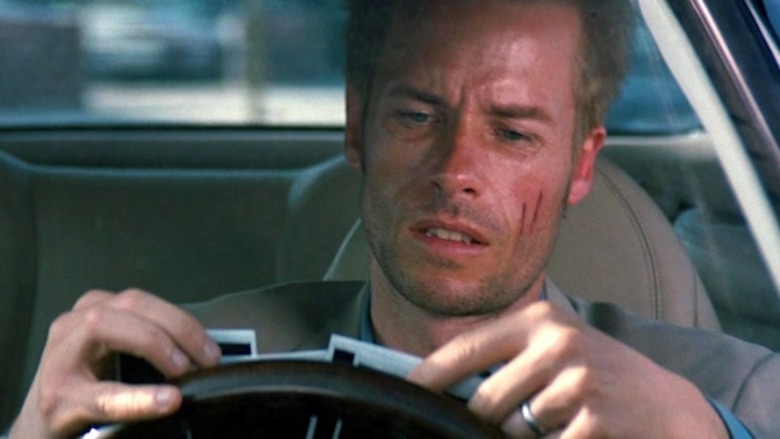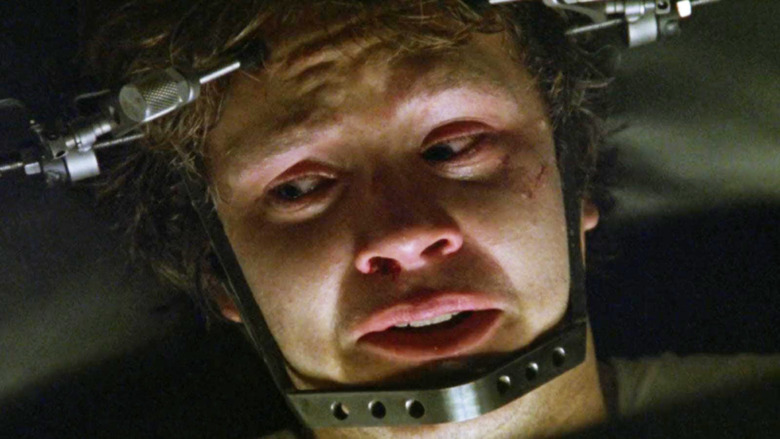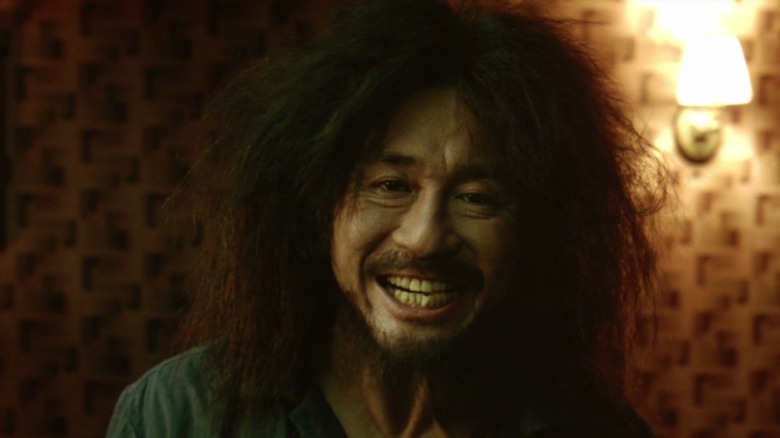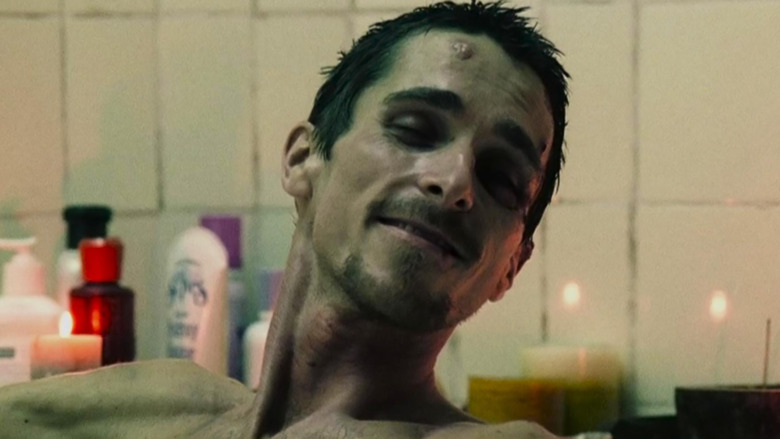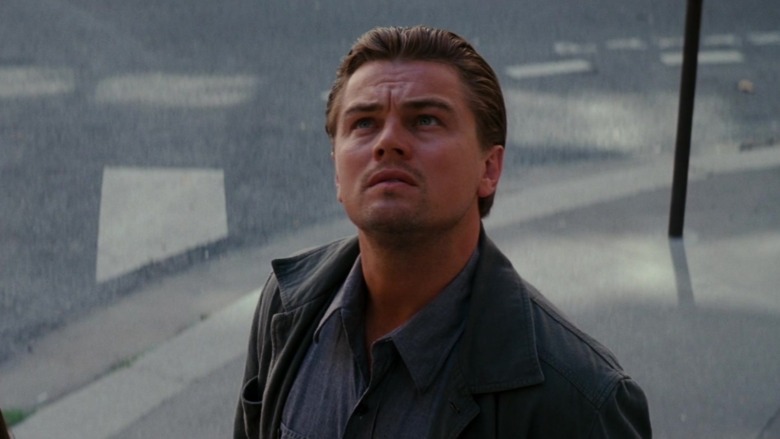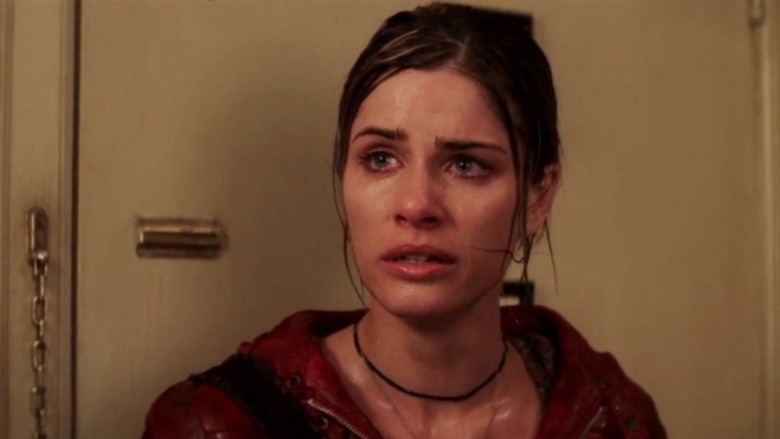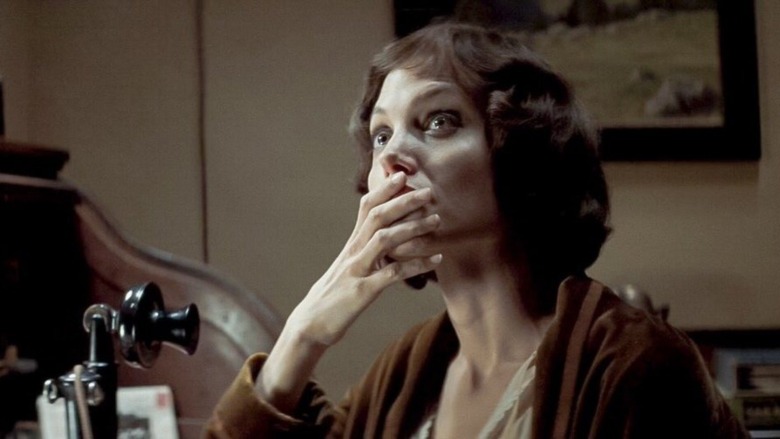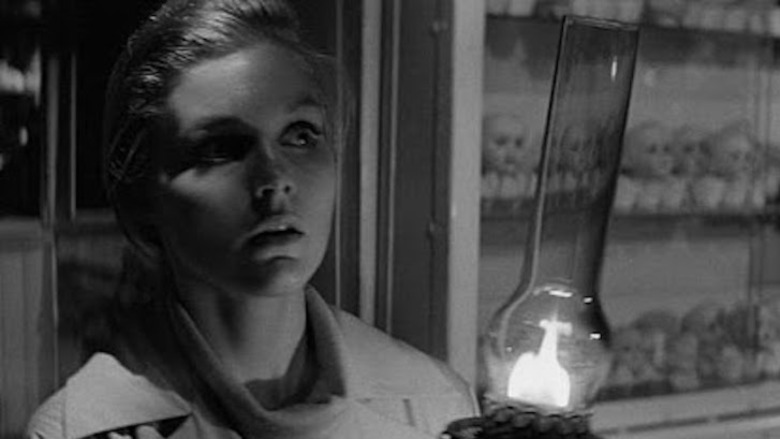13 Movies Like Shutter Island You Need To Watch Tonight
Every Martin Scorsese film is worth watching, and one we'd like to see get more attention is 2010's Shutter Island – a dark and brooding neo-noir that's sure to surprise you. Leonardo DiCaprio is really riveting as Teddy Daniels, a U.S. marshal who comes to an isolated psychiatric hospital to investigate a supposedly missing patient. But the case is far more complicated than anyone could initially guess. The hospital has seemingly endless secrets ... and soon, Teddy can't even trust himself. We heartily second Roger Ebert's review of the film, which says, "That's what the movie is about: atmosphere, ominous portents, the erosion of Teddy's confidence and even his identity. It's all done with flawless directorial command."
If you love Shutter Island as much as we do, you might want some other movies that will scratch the same itch. We've got a great lineup for you, with films full of conspiracies and twists and turns, featuring heavy atmosphere and eerily unreliable "reality." Pick up any one of these, and you're sure to be satisfied.
If you're looking for Shutter Island-style conspiracies, check out The Game
The Game is a masterwork of paranoia, conspiracy, and buried pain. It's a suspenseful deep dive into an external mystery and one man's troubled psychology, making it a perfect companion piece to Shutter Island. The film centers on Nicholas Van Orton (Michael Douglas), a dispassionate and ruthless investment banker who gets an unexpected birthday present from his screw-up younger brother (Sean Penn). It's an experience — a game. But as soon as Nicholas gets involved with the mysterious Consumer Recreation Services, his well-ordered life goes dangerously off the rails.
The movie deploys its pulpy thrills smartly and stylishly and grounds them in Douglas' slowly unraveling performance. Amped-up plotting that's both implausible and energetic is one of the pleasures of Shutter Island, and it's a delight viewers can get here too. As Entertainment Weekly put it, "Douglas is the perfect actor to occupy the center of a crazed Rube Goldberg thriller. The movie has the wit to be playful about its own manipulations, even as it exploits them for maximum pulp impact."
Game filmmaker David Fincher was originally considered as a potential director for Shutter Island, so it's unsurprising that his movies have a similar intensity and visual flair. Most Fincher movies would probably appeal to Shutter Island fans, but we'd recommend starting here.
The Prestige is a twisty magic trick
If you like Shutter Island because you like complex, twisty historical thrillers with plenty of moral ambiguity and heavy-duty drama, go ahead and settle in with Christopher Nolan's The Prestige. The movie is about an obsessive and vicious feud between two 19th-century stage magicians, played by Hugh Jackman and Christian Bale.
Shutter Island is all about Teddy, but The Prestige splits its psychological suspense between dueling protagonists. It might result in slightly simpler characters, but it allows for plenty of crackling drama. This is one battle of the wills you won't be able to look away from, and sure enough, The Prestige is highly acclaimed. Empire's Dan Jolin described it thusly: "Like a street-illusionist making coins dance across his knuckles, [Nolan] draws his audience in as close as possible. The harder we're looking, the more we're concentrating, the more effective his ultimate misdirection will prove."
Like Shutter Island, The Prestige invites rewatches, and you'll have the same question for it — the same one people have for most magicians, actually: "How'd he do that?"
Vertigo is perfect for a Shutter Island double feature
Alfred Hitchock's Vertigo — sometimes hailed as the single best movie ever made — is an absolutely iconic mindbender movie and a classic of psychological suspense. And sure, almost all of Hitchcock's movies are iconic suspense classics, but Vertigo takes it to another, dizzying level. The story follows Scottie (played by an almost feverishly intense Jimmy Stewart), a San Francisco detective on leave due to a traumatic experience that left him with a severe fear of heights. He gets drawn into an off-hours case involving a beautiful, almost otherworldly woman named Madeleine (Kim Novak), and Madeleine's husband tells Scottie his wife is being possessed by the spirit of her great-grandmother.
It sounds like the setup of a ghost story but quickly becomes something stranger. Without giving too much of the plot away, we'll say that Scottie soon finds himself falling into a vortex of desire, deceit, and doppelgängers. It's a story of obsession and slippery reality, making it a natural fit for a double feature with Shutter Island, with Hitchcock's perspective coming out even grimmer and darker than Scorsese's.
Black Swan is a psychological thriller about pirouettes and paranoia
At first, you wouldn't think Shutter Island and Darren Aronofsky's Black Swan would have too much in common. One is a mystery with an FBI agent unraveling layers of truth and lies at an island hospital. The other is all about a ballerina struggling with the pressures that come with the role of a lifetime. But if you scratch the surface, the two films share a lot of DNA.
When Nina (Natalie Portman) gets the challenging lead role in Swan Lake, it's a catalyst for all her insecurities, ambitions, and bottled-up desires, and everyone in her life seems to make the anxieties worse. Her mother (Barbara Hershey) is suffocating and emotionally manipulative. Her only would-be friend, the sparkling Lily (Mila Kunis), might betray her for the part. Her director (Vincent Cassel) could decide at any moment that she's not up for the role. Forget about opening night — the real drama in Black Swan is all in Nina's head, as the whole world becomes an exaggerated part of her delusions and paranoia.
In fact, you could say that Black Swan is like Shutter Island turned inside out, with all the surprises in Shutter Island being up-front text in Black Swan — which saves its own peculiar twists for later. And it's excellent. Reason called it an "ambitious shocker" that's "infused with ... creative brio."
Mulholland Drive is a surreal mystery that will make you question everything
Identity can be a slippery, unreliable concept, and passion and guilt make it even harder to hold onto. That's specially true in the world of Mulholland Drive. David Lynch's surreal film defies most straightforward interpretations, but as its characters find themselves seemingly trapped in a Hollywood conspiracy and are forced to question reality and even their own identities, it's a direct parallel to Shutter Island.
In Mulholland Drive, the story belongs to Betty (Naomi Watts), a bubbly and innocent woman who comes to Los Angeles in the hope of becoming an actress. She finds Rita (Laura Elena Harring), who's suffering from severe amnesia, and the two are instantly drawn to each other. Betty begins to help Rita find out about her past and true identity, but her story leads them to dark and strange places.
Any film as defiantly weird as Mulholland Drive is going to find both intense haters and devoted fans, but it's clear which side has won in cinematic history. It's a sexy, colorful mystery that feels like a bizarre dream — one that will have you questioning your own memories. And it will definitely make you think twice before exploring behind a diner.
Christopher Nolan plays with time and memory in Memento
Christopher Nolan's 2000 breakout film, Memento, didn't invent the jaw-droppingly twist-filled psychological thriller, but it may have perfected it. The film is about Leonard (an electric Guy Pearce), who's now unable to create and store new memories. He has to resort to a complex system of photographs, notes, and even tattoos to clue himself into where he is and what he's doing. And he has a lot to do. Despite all the chaos in his head, he's determined to find John G., the man who raped and murdered his wife and shattered his memory.
Nolan tells Leonard's story in reverse, periodically jumping back a step so we share Leonard's disorientation while, like him, trying to make sense of partial clues in the middle of a lot of confusion. But as fun as Memento is at its most mind-boggling, it's even better once you finally start to understand. Or at least think you understand.
Film critic William Arnold with The Seattle Post-Intelligencer called the film "a whole new kind of cinematic experience," adding, "Amazingly, 29-year-old writer-director Nolan ... not only makes Memento work as a non-linear puzzle film, but as a tense, atmospheric thriller and a first-rate vehicle for Pearce." Memento offers substance as well as novelty, and that's enough to make it hold up for all of our repeating viewings.
Jacob's Ladder is like Shutter Island with demons
Released in 1990, Jacob's Ladder is an eerie, haunting film about the aftermath of the Vietnam War and the razor-sharp edges of one man's disintegrating mind. Jacob Singer (Tim Robbins) is a veteran plagued with demonic visions and horrors, and he's apparently being stalked by disaster. He can't be sure that he's safe. Is he being targeted by someone? He can't be sure that he's sane. Can he trust his own perceptions? Then he seems to slide between realities, like the whole world is morphing around him. It may all tie back to some experiment he and his unit went through during the war, or it could be something even stranger.
Jacob's Ladder really captures the same sense of grim horror and uncertainty as Shutter Island, and it's likewise well-directed and well-acted. It packs a dark, undeniable wallop, and the strong emotions help sell the film's intellectual ambitions. You want to figure out the puzzle, and the whole time you're trying, you're on the edge of your seat and probably holding your breath. New York Times critic Janet Maslin called it "a slick, riveting, viscerally scary film about what in other hands would be a decidedly unsalable subject, namely death."
Oldboy is a truly brutal thriller from South Korea
If you want a torturous conspiracy, they don't get any more elaborate or pitch-black than Park Chan-wook's Oldboy. There might still be people who think that all international movies are quiet, artsy pictures, but trust us, that illusion won't survive a viewing of South Korea's Oldboy, which is basically an ambassador for visceral, powerfully dramatic cinema.
Oldboy is the story of businessman Oh Dae-su, whose life takes a horrific turn when he's kidnapped and imprisoned. Dae-su spends 15 years locked in a hotel room, with no idea why he's there or who would want to do this to him. All he sees of the outside world comes from his TV screen ... and the news informs him that his wife is dead and everyone thinks he's responsible. He doesn't even know what's happened to his younger daughter. All he can do is spend the intervening years physically and mentally honing himself for escape and revenge. But when he's unexpectedly released from his bizarre prison, the story is far from over.
The film received high praise, with Stephanie Zacharek at Salon saying, "It's a grand, gritty, indelible experience, the sort of picture that ... envelops you in a well-told story while also evoking subtle but strong gradations of emotion. ... It's like a flower watered with blood."
The Machinist grapples with guilt
If you missed The Machinist back in 2004, we don't blame you. Sure, it starred Christian Bale, but this was still before Batman Begins — and we also wouldn't blame you if you took one look at the movie and found the pallid, skeletal Bale utterly unrecognizable. In order to get his weight down to play the emaciated Trevor Reznick, Bale limited his diet to "black coffee, a solitary apple, and a tin of tuna every day." Yikes. Make sure to snack on something while watching this, just to counterbalance all that.
But there's more to the film than Bale's ghoulish, emaciated form. The Machinist is one of the best films ever made about trying and failing to live with guilt — to live, as Shutter Island says, "as a monster." Trevor is dealing with debilitating insomnia that's stripped away his weight and made his perceptions spotty and flawed. Something's going on with him, but even he's not sure what. All he knows — and for a time, all we know — is that whatever it is, it could kill him. The stakes are high, and the rules of the game are uncertain. And the film makes it impossible to look away.
Inception is a fascinating companion piece to Shutter Island
Like a lot of Christopher Nolan's films, Inception is a fantastic puzzle box and a deeply clever sci-fi story with the gripping suspense of a thriller – and the psychology of one too. At its core, it's the story of a man struggling with the weight of his own guilt.
Leonardo DiCaprio plays Dom Cobb, a professional thief who uses cutting-edge dream technology to commit acts of corporate espionage. He longs to get back to his two children America, but he can't return home until he clears his name. All he needs is to do one high-profile job for Saito (Ken Watanabe), who has the wealth to pull all the necessary strings. It's just that the job — implanting an idea in another person's subconscious — is considered almost impossible. The clock is ticking, and Cobb has to sell his fantasies convincingly enough to provide real pathos.
That setup — even more than the shared presence of Leonardo DiCaprio — binds Inception and Shutter Island together. After all, one of the best reasons to rewatch Shutter Island is the fun of putting together how the world of the story is constructed for the benefit of DiCaprio's Teddy. It features its own case of attempted inception, in a way, and it's fascinating to compare the way the process works in the two movies.
Identity is a psychological thriller that will keep you guessing
Let's say you want a foreboding thriller in a stormy remote location, and you want it all wrapped up in some questionable therapeutic methods. You could watch Shutter Island, or you could turn to 2003's Identity, a tricky homage to And Then There Were None. It's a fun and curveball-filled blend of psychological thriller and slasher movie tropes, and it has a cast filled with people we love to see — John Cusack, Ray Liotta, Amanda Peet, John Hawkes, Clea DuVall, John C. McGinley, and Alfred Molina, among others.
Identity revolves around a group of characters who take shelter in a run-down motel during a bad storm ... and soon find themselves being killed off one by one. Somehow, all of this relates to a debate happening elsewhere, one which will rule on the sanity of a convicted killer and determine whether or not he gets a stay of execution.
While Identity's twists drew some criticism, the film's audacity and unpredictability also won over plenty of critics and moviegoers. SF Gate's Mick LaSalle said, "The retro style is a conscious choice, not a crutch, because at heart Identity is postmodern, creative and quite new." And as the critic also noted, if you try to guess the killer's identity, chances are pretty good that you'll guess wrong.
Changeling is a real-life story about a shocking conspiracy
Clint Eastwood's Changeling handles some of the same things as Shutter Island — historical atmosphere, a conspiracy, questioned perceptions, and a truth that might be too devastating to handle.
The film stars Angelina Jolie as Christine Collins, a mother whose young son is abducted. His disappearance leads to outcry against the LAPD, but the public is soon satisfied by a happy ending. The police find the boy and return him to his mother. Or do they? Christine is adamant that the child they've given her is not his son, no matter what he says, but the system is eager to push all her objections aside. The boy is shorter than her son was? Um, let's say that trauma just does that sometimes. Don't worry about it.
Of course, Christine can't just accept this replacement son, and that brings down a lot of institutional ire on her head, as the police and city would rather have hospitalized than take her concerns seriously. They just want all this to be over. All of this results in a tense, chilling psychological thriller that Shutter Island fans should love. Empire Online called it a "fabulous drama" that weaves neatly between genres, turning from noir to horror to courtroom drama. Fans of any genre are sure to be satisfied with this dark treat.
Bunny Lake Is Missing is a thriller that feels like a nightmare
Released in 1965, Bunny Lake Is Missing is mysterious and almost surreally disorientating. It might be the ultimate "missing person" drama since it's a film where the disappearance is so total that it seems like the vanished character may never have existed at all.
Little Bunny Lake is a young child who's recently moved to London with her mother, Ann (Carol Lynley), a single mom in a time where that status attracts plenty of attention. Ann insists that her daughter is missing. She dropped Bunny off at preschool this morning, and now the girl is nowhere to be seen. But the school administrators only remember meeting Ann. Little girl? What little girl? And Ann's apartment is devoid of children's clothes or toys. Falling apart at the seams, Ann maintains that someone has robbed her, stripping away any sign of her daughter's existence. You can imagine how plausible that seems to the police.
The twists and turns steadily mount up. As The A.V. Club put it, the film is an "unsettling funhouse ride where nothing can be assumed or assured." Like Shutter Island, it straddles the line between crime and horror and loves its Gothic touches (we're still haunted by a basement filled with endless creepy dolls). It might not be the most plausible psychological suspense movie ever made, but it's still one of the best and definitely one of the most nightmarish.
